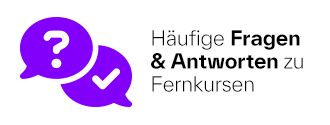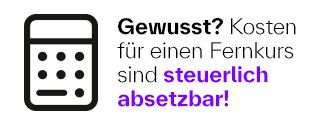Distance learning course in agile quality management
Successfully introducing innovative and flexible quality management

Author: Gabriela Zimmermann
- History and development Quality assurance and quality management (QM)
- The principles of QM according to ISO 9001:2015
- The responsibility of management in QM
- Processes in QM
- Implementation, actively controlling and evaluating quality
- Non-compliance and corrective actions
- Integrated management systems
- QM and compliance, risk management, sustainability and data protection
Author: Ulrike Margit Wahl
- The agile manifesto, the agile funnel
- Manifesto for agile quality management
- Agile methods in QM - Design Thinking, Scrum, Kanban and Kaizen
- Seven success factors on the way to agile QM
- Goals and advantages of agile QM
- Opportunities for change in culture, role and leadership?
- Limits of agile QM
- Similarities and differences between agile and classic QM
- Outlook on how agile QM can break up standardized thinking
Author: Susanne Petersen
- Job, role and reality - concepts and blind spots
- The contemporary approach: the "social" role at work
- Roll phases and altitude: starting, doing and ending job
- Areas of strength and tension in your role
- Role clarification: understanding, avoiding and utilizing tension and conflicts
- Impulses, ideas, role models from the new world of work
- Skillfully juggling roles
Author: Ulrike Margit Wahl
- On the way to customer and business focus: Start with Why, 5 Why, Kaizen, Makigami
- Understanding customer needs with use cases, story mapping and personas
- Living responsibility and commitment: Error culture, psychological safety, Start Smart Canvas and much more.
- Networked working: WeQ, celebrate successes, visualization, Kanban board, Dark Horse
- Early testing and fast learning: prototyping, kill your darlings, ...
- Meaningful key figures and the relevance of their impact
- Build quality expertise in all areas, streamline management
- Stacey matrix as a compass and all tools at a glance
Author: Clemens Rehbein
- Why do we need processes?
- Bureaucracy and regulatory frenzy, process types, role and function
- How standards came about, Harmonized / High Level Structure
- Achieving business goals sustainably
- Setting up process landscapes for the agile environment
- Assessing organizations through audits
- The evaluation of results
- Determine the right measures
- Effectiveness and lessons learned
Author: Dr. Sven Sebastian
- People as actors and producers in everyday working life:
Behavior, motivation, information processing and the human decision-making model - Neurocognitive skills: critical thinking, problem-solving skills
- Neurobiological skills: stress management, self-regulation
- Psycho-emotional skills: Empathy, commitment and motivational skills
- Social skills: communication, criticism and humor
- Media and procedural skills
- Interdisciplinary thinking: Innovation, error culture, value management
Author: Clemens Rehbein
- External and internal quality: a basic attitude
- The function of an agile quality department in practice
- Quick Response Quality Control (QRQC) - An agile method of quality improvement
- Supplier development
- Rolling out global management systems
- Key figure systems
- Store Floor Management
- Pragmatic portfolio boards
- Agile management of customer satisfaction
Author: Ulrike Margit Wahl
Online training to reflect on the learning journey
Together with the author of the 2nd and 4th modules, you will look back on your learning journey and take a look into the future:
- What lessons have you learned for yourself?
- Where can you use agile quality management in your practice?
- What are you still missing on the way to agile quality management?
- ...
- Online training to deepen the module "Relevant roles in agile quality management"
- Online training to reflect on the learning journey (Module 8)
E-test:
You can complete the distance learning course with an e-exam . The prerequisite for this is that you have completed the entire content of the "Agile Quality Management" distance learning course. If you book the distance learning course and the e-exam at the same time, you will receive a discount of over 30% on the e-exam. You can find more information on the "Distance learning course certified agile quality manager". The basic modules 1-6 are relevant for the exam.
Learning environment
In your personal online learning environment , all learning content will be available to you online from the start of the distance learning course. You will also find interactive learning assessments and other additional content for your course, as well as the opportunity to exchange ideas with other course participants. The materials are updated regularly and are available to you without restriction for 12 months. We are happy to offer you a free extension of 6 months if required.
Your benefit
- You know the basics of classic and agile quality management, their similarities, differences, advantages and disadvantages, as well as goals and limitations.
- You will recognize the added value that agile quality management can offer for your QM and get to know new methods and tools.
- You know what conditions need to be in place in organizations in order to introduce agile quality management and understand the role that employees play in this.
- Using various practical examples, you will learn how the theoretical content can be transferred to everyday working life.
- You can prove your newly acquired knowledge with a certificate of attendance.
Technical management
Procedure
You will receive helpful learning tips via your online learning environment as soon as you book. You will have access to all learning content at the start of the distance learning course. Seven days later, you will receive all the basic modules in printed form.
Tools
Recommended for
Quality managers and quality management officers, clerks and employees from quality management who would like to develop or expand their knowledge in the area of agile quality management. career changers from related areas who have already had initial contact with quality management and would like to delve deeper into the topic.
Distance learning with Haufe Akademie:
Flexible further education ‐ when and where you want!
Haufe Akademie's distance learning courses offer you maximum flexibility for your professional development. They include self-study phases with modern e-learning elements and thus guarantee your learning success.
Distance learning with Haufe Akademie:
Flexible further education ‐ when and where you want!
Flexible: You learn independently of time and place
Practice-oriented: Comprehensive knowledge, prepared for you with practical relevance
Up to date: The content in your personal online learning environment is updated on an ongoing basis.
Success confirmed: A certificate of attendance and a badge confirm your participation and the high quality of the course content
Individual: On request, we can extend the access time to all course content free of charge.
Learning community

In our learning community LUX, you can exchange ideas with other participants and share professional experiences. Network with people from all over Germany, form learning groups, help others with your own knowledge or, conversely, benefit from the knowledge of other participants. It's easier to learn together!
41100
Start dates and details
Partial payments are possible for this training event .
You will receive the first partial invoice on the start date and the subsequent invoices every 4 weeks.
1st partial invoice:
€596.67 plus VAT
€710.04 including VAT
2nd Partial invoice:
€596.67 plus VAT.
€710.04 including VAT.
3. Partial invoice:
€596.67 plus VAT.
€710.04 including VAT.
Flexible start
Entry is also possible between the start dates by arrangement.
Tel.: 0761 595339 00
Partial payments are possible for this training event .
You will receive the first partial invoice on the start date and the subsequent invoices every 4 weeks.
1st partial invoice:
€596.67 plus VAT
€710.04 including VAT
2nd Partial invoice:
€596.67 plus VAT.
€710.04 including VAT.
3. Partial invoice:
€596.67 plus VAT.
€710.04 including VAT.
Flexible start
Entry is also possible between the start dates by arrangement.
Tel.: 0761 595339 00
Partial payments are possible for this training event .
You will receive the first partial invoice on the start date and the subsequent invoices every 4 weeks.
1st partial invoice:
€596.67 plus VAT
€710.04 including VAT
2nd Partial invoice:
€596.67 plus VAT.
€710.04 including VAT.
3. Partial invoice:
€596.67 plus VAT.
€710.04 including VAT.
Flexible start
Entry is also possible between the start dates by arrangement.
Tel.: 0761 595339 00
Partial payments are possible for this training event .
You will receive the first partial invoice on the start date and the subsequent invoices every 4 weeks.
1st partial invoice:
€596.67 plus VAT
€710.04 including VAT
2nd Partial invoice:
€596.67 plus VAT.
€710.04 including VAT.
3. Partial invoice:
€596.67 plus VAT.
€710.04 including VAT.
Flexible start
Entry is also possible between the start dates by arrangement.
Tel.: 0761 595339 00
Partial payments are possible for this training event .
You will receive the first partial invoice on the start date and the subsequent invoices every 4 weeks.
1st partial invoice:
€596.67 plus VAT
€710.04 including VAT
2nd Partial invoice:
€596.67 plus VAT.
€710.04 including VAT.
3. Partial invoice:
€596.67 plus VAT.
€710.04 including VAT.
Flexible start
Entry is also possible between the start dates by arrangement.
Tel.: 0761 595339 00
Partial payments are possible for this training event .
You will receive the first partial invoice on the start date and the subsequent invoices every 4 weeks.
1st partial invoice:
€596.67 plus VAT
€710.04 including VAT
2nd Partial invoice:
€596.67 plus VAT.
€710.04 including VAT.
3. Partial invoice:
€596.67 plus VAT.
€710.04 including VAT.
Flexible start
Entry is also possible between the start dates by arrangement.
Tel.: 0761 595339 00
Partial payments are possible for this training event .
You will receive the first partial invoice on the start date and the subsequent invoices every 4 weeks.
1st partial invoice:
€596.67 plus VAT
€710.04 including VAT
2nd Partial invoice:
€596.67 plus VAT.
€710.04 including VAT.
3. Partial invoice:
€596.67 plus VAT.
€710.04 including VAT.
Flexible start
Entry is also possible between the start dates by arrangement.
Tel.: 0761 595339 00
Partial payments are possible for this training event .
You will receive the first partial invoice on the start date and the subsequent invoices every 4 weeks.
1st partial invoice:
€596.67 plus VAT
€710.04 including VAT
2nd Partial invoice:
€596.67 plus VAT.
€710.04 including VAT.
3. Partial invoice:
€596.67 plus VAT.
€710.04 including VAT.
Flexible start
Entry is also possible between the start dates by arrangement.
Tel.: 0761 595339 00
Partial payments are possible for this training event .
You will receive the first partial invoice on the start date and the subsequent invoices every 4 weeks.
1st partial invoice:
€596.67 plus VAT
€710.04 including VAT
2nd Partial invoice:
€596.67 plus VAT.
€710.04 including VAT.
3. Partial invoice:
€596.67 plus VAT.
€710.04 including VAT.
Flexible start
Entry is also possible between the start dates by arrangement.
Tel.: 0761 595339 00
Partial payments are possible for this training event .
You will receive the first partial invoice on the start date and the subsequent invoices every 4 weeks.
1st partial invoice:
€596.67 plus VAT
€710.04 including VAT
2nd Partial invoice:
€596.67 plus VAT.
€710.04 including VAT.
3. Partial invoice:
€596.67 plus VAT.
€710.04 including VAT.
Flexible start
Entry is also possible between the start dates by arrangement.
Tel.: 0761 595339 00
Partial payments are possible for this training event .
You will receive the first partial invoice on the start date and the subsequent invoices every 4 weeks.
1st partial invoice:
€596.67 plus VAT
€710.04 including VAT
2nd Partial invoice:
€596.67 plus VAT.
€710.04 including VAT.
3. Partial invoice:
€596.67 plus VAT.
€710.04 including VAT.
Flexible start
Entry is also possible between the start dates by arrangement.
Tel.: 0761 595339 00
Partial payments are possible for this training event .
You will receive the first partial invoice on the start date and the subsequent invoices every 4 weeks.
1st partial invoice:
€596.67 plus VAT
€710.04 including VAT
2nd Partial invoice:
€596.67 plus VAT.
€710.04 including VAT.
3. Partial invoice:
€596.67 plus VAT.
€710.04 including VAT.
Flexible start
Entry is also possible between the start dates by arrangement.
Tel.: 0761 595339 00
Partial payments are possible for this training event .
You will receive the first partial invoice on the start date and the subsequent invoices every 4 weeks.
1st partial invoice:
€596.67 plus VAT
€710.04 including VAT
2nd Partial invoice:
€596.67 plus VAT.
€710.04 including VAT.
3. Partial invoice:
€596.67 plus VAT.
€710.04 including VAT.
Flexible start
Entry is also possible between the start dates by arrangement.
Tel.: 0761 595339 00
Partial payments are possible for this training event .
You will receive the first partial invoice on the start date and the subsequent invoices every 4 weeks.
1st partial invoice:
€596.67 plus VAT
€710.04 including VAT
2nd Partial invoice:
€596.67 plus VAT.
€710.04 including VAT.
3. Partial invoice:
€596.67 plus VAT.
€710.04 including VAT.
Flexible start
Entry is also possible between the start dates by arrangement.
Tel.: 0761 595339 00
Partial payments are possible for this training event .
You will receive the first partial invoice on the start date and the subsequent invoices every 4 weeks.
1st partial invoice:
€596.67 plus VAT
€710.04 including VAT
2nd Partial invoice:
€596.67 plus VAT.
€710.04 including VAT.
3. Partial invoice:
€596.67 plus VAT.
€710.04 including VAT.
Flexible start
Entry is also possible between the start dates by arrangement.
Tel.: 0761 595339 00
Partial payments are possible for this training event .
You will receive the first partial invoice on the start date and the subsequent invoices every 4 weeks.
1st partial invoice:
€596.67 plus VAT
€710.04 including VAT
2nd Partial invoice:
€596.67 plus VAT.
€710.04 including VAT.
3. Partial invoice:
€596.67 plus VAT.
€710.04 including VAT.
Flexible start
Entry is also possible between the start dates by arrangement.
Tel.: 0761 595339 00
FAQ about the Agile Quality Management distance learning course
The distance learning course teaches you how agile principles such as Scrum or Kanban can be integrated into existing quality management systems. You will learn how to use agile methods to make processes more flexible and efficient.
Agile quality management enables a faster response to changes, promotes continuous improvement and increases customer satisfaction through iterative processes and regular feedback.
The course offers strategies for introducing agile methods in the team, including training concepts and change management techniques to overcome resistance and promote acceptance.
You will learn how to use tools such as Jira or Trello and find out how techniques such as user stories, retrospectives and daily stand-ups can be applied in quality management.
The course shows how you can define and use KPIs (Key Performance Indicators) to evaluate and continuously improve the success of agile quality management measures.
You will receive a guide for the transition, including the identification of pilot projects, stakeholder management and the gradual introduction of agile practices.






